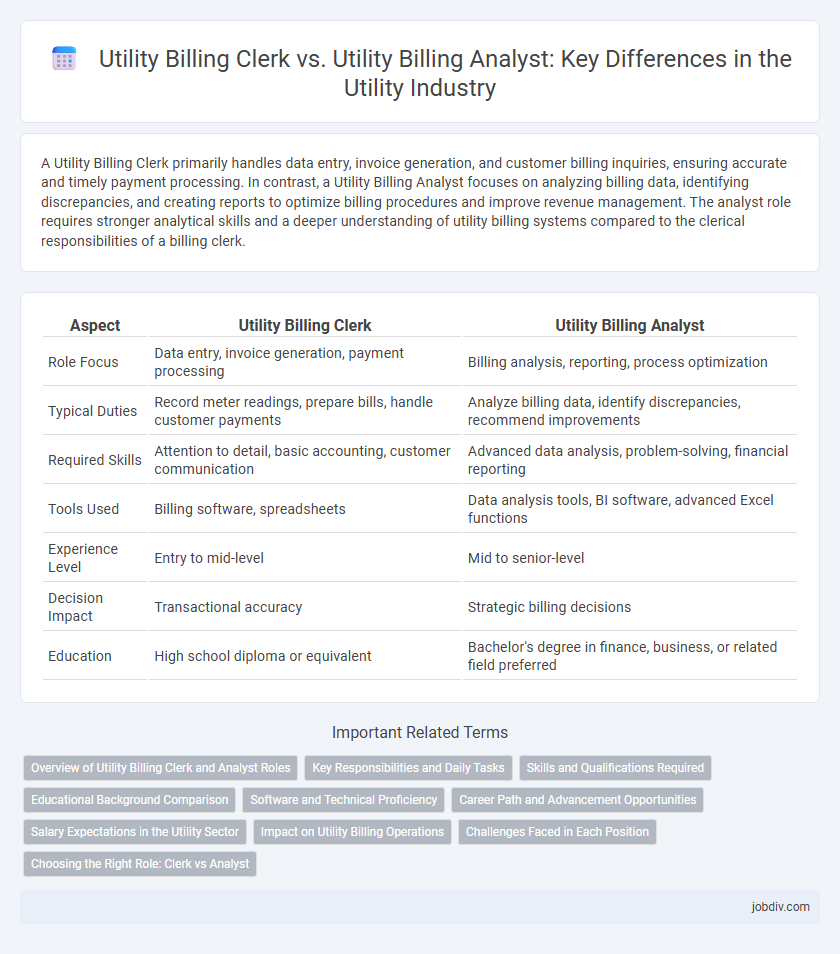A Utility Billing Clerk primarily handles data entry, invoice generation, and customer billing inquiries, ensuring accurate and timely payment processing. In contrast, a Utility Billing Analyst focuses on analyzing billing data, identifying discrepancies, and creating reports to optimize billing procedures and improve revenue management. The analyst role requires stronger analytical skills and a deeper understanding of utility billing systems compared to the clerical responsibilities of a billing clerk.
Table of Comparison
| Aspect | Utility Billing Clerk | Utility Billing Analyst |
|---|---|---|
| Role Focus | Data entry, invoice generation, payment processing | Billing analysis, reporting, process optimization |
| Typical Duties | Record meter readings, prepare bills, handle customer payments | Analyze billing data, identify discrepancies, recommend improvements |
| Required Skills | Attention to detail, basic accounting, customer communication | Advanced data analysis, problem-solving, financial reporting |
| Tools Used | Billing software, spreadsheets | Data analysis tools, BI software, advanced Excel functions |
| Experience Level | Entry to mid-level | Mid to senior-level |
| Decision Impact | Transactional accuracy | Strategic billing decisions |
| Education | High school diploma or equivalent | Bachelor's degree in finance, business, or related field preferred |
Overview of Utility Billing Clerk and Analyst Roles
Utility Billing Clerks manage routine billing tasks, including data entry, invoice preparation, and payment processing to ensure accurate customer account maintenance. Utility Billing Analysts handle complex data analysis, rate structure evaluation, and trend reporting to optimize billing strategies and improve revenue management. Both roles are essential for maintaining efficient utility billing operations and ensuring financial accuracy.
Key Responsibilities and Daily Tasks
Utility Billing Clerks manage customer accounts by processing payments, issuing invoices, and resolving billing inquiries to ensure accurate and timely billing cycles. Utility Billing Analysts interpret billing data, conduct complex reconciliations, and generate reports to identify discrepancies, trends, and optimize revenue collection. Both roles require strong attention to detail and proficiency with billing software, but analysts focus more on data analysis and strategic improvements while clerks handle routine transaction processing and customer communication.
Skills and Qualifications Required
Utility Billing Clerks require strong data entry skills, proficiency in billing software, and attention to detail to accurately process customer accounts and payments. Utility Billing Analysts need advanced analytical abilities, expertise in financial reporting tools, and experience in data interpretation to evaluate billing trends and resolve discrepancies. Both roles benefit from knowledge of utility regulations, customer service skills, and familiarity with accounting principles.
Educational Background Comparison
Utility Billing Clerks typically require a high school diploma or equivalent, with on-the-job training sufficing for most entry-level positions. Utility Billing Analysts often hold an associate or bachelor's degree in fields such as finance, accounting, or business administration to handle complex data analysis and reporting. Advanced education for Analysts equips them with skills in data management software, financial modeling, and regulatory compliance essential for optimizing utility billing processes.
Software and Technical Proficiency
Utility Billing Clerks typically manage routine data entry and basic software systems such as billing databases and customer management tools, emphasizing accuracy and consistency in billing records. Utility Billing Analysts require advanced technical proficiency, utilizing analytical software like SQL, Excel Power Query, or specialized utility billing platforms to interpret complex billing data and identify discrepancies or trends. Analysts often collaborate with IT teams to customize reporting tools and automate billing processes, enhancing operational efficiency and data accuracy.
Career Path and Advancement Opportunities
Utility Billing Clerks primarily manage customer billing accounts and process payments, providing foundational experience in utility billing systems. Utility Billing Analysts build on this foundation by performing data analysis and generating reports to optimize billing accuracy and efficiency, positioning themselves for roles in financial management or regulatory compliance within utilities. Career advancement for Clerks typically leads to Analyst roles, while Analysts may progress to supervisory or strategic planning positions in utility finance.
Salary Expectations in the Utility Sector
Utility Billing Clerks typically earn an average salary ranging from $35,000 to $50,000 annually, reflecting entry-level responsibilities such as processing customer bills and maintaining account records. Utility Billing Analysts command higher salaries, often between $55,000 and $75,000 per year, due to their advanced roles involving data analysis, forecasting, and improving billing accuracy within utility companies. Salary expectations in the utility sector vary based on experience, geographic location, and the complexity of billing systems managed by each position.
Impact on Utility Billing Operations
Utility Billing Clerks handle day-to-day activities such as processing customer payments, generating bills, and maintaining accurate account records to ensure smooth billing cycles. Utility Billing Analysts focus on analyzing billing data, identifying discrepancies, and optimizing billing processes to improve accuracy and operational efficiency. The combined efforts of both roles significantly enhance the reliability and effectiveness of utility billing operations.
Challenges Faced in Each Position
Utility Billing Clerks frequently encounter challenges such as managing high volumes of customer accounts, ensuring accuracy in data entry, and addressing billing discrepancies promptly to maintain customer satisfaction. Utility Billing Analysts face more complex obstacles like analyzing large datasets for billing trends, identifying and resolving systemic errors, and developing improved billing processes to enhance efficiency and compliance. Both roles require strong attention to detail, but analysts must also apply critical thinking and problem-solving skills to interpret data and support strategic decision-making.
Choosing the Right Role: Clerk vs Analyst
Utility Billing Clerks handle routine billing processes, data entry, and customer inquiries, making them ideal for those seeking structured tasks and direct client interaction. Utility Billing Analysts focus on analyzing billing data, identifying discrepancies, and improving billing systems, suiting professionals with strong analytical skills and a detail-oriented mindset. Choosing between the two roles depends on whether you prefer operational support and administrative duties or data-driven problem-solving and process optimization.
Utility Billing Clerk vs Utility Billing Analyst Infographic

 jobdiv.com
jobdiv.com